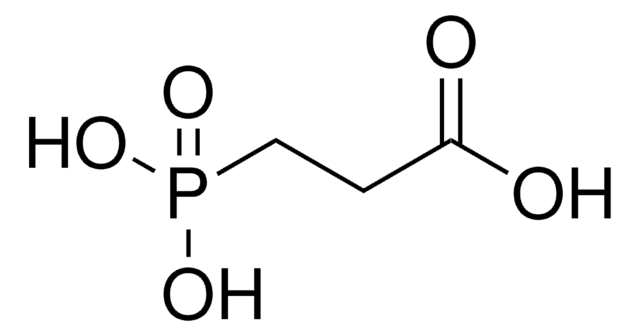About This Item
Recommended Products
Assay
97%
form
solid
mp
98-104 °C
SMILES string
OC(=O)CCCCCP(O)(O)=O
InChI
1S/C6H13O5P/c7-6(8)4-2-1-3-5-12(9,10)11/h1-5H2,(H,7,8)(H2,9,10,11)
InChI key
SYFTUNQVCGSBOV-UHFFFAOYSA-N
Related Categories
General description
Application
Storage Class Code
11 - Combustible Solids
WGK
WGK 3
Flash Point(F)
Not applicable
Flash Point(C)
Not applicable
Personal Protective Equipment
Certificates of Analysis (COA)
Search for Certificates of Analysis (COA) by entering the products Lot/Batch Number. Lot and Batch Numbers can be found on a product’s label following the words ‘Lot’ or ‘Batch’.
Already Own This Product?
Find documentation for the products that you have recently purchased in the Document Library.
Customers Also Viewed
Articles
Thin, lightweight, and flexible electronic devices meet widespread demand for scalable, portable, and robust technology.
Thin, lightweight, and flexible electronic devices meet widespread demand for scalable, portable, and robust technology.
Thin, lightweight, and flexible electronic devices meet widespread demand for scalable, portable, and robust technology.
Thin, lightweight, and flexible electronic devices meet widespread demand for scalable, portable, and robust technology.
Our team of scientists has experience in all areas of research including Life Science, Material Science, Chemical Synthesis, Chromatography, Analytical and many others.
Contact Technical Service









